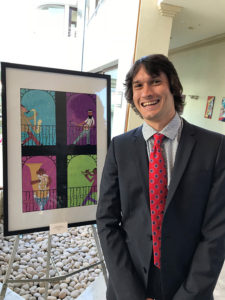Humor has developmental milestones.
By Debra Muzikar
Driving with Kevin we spot this sign.
“Slow children at play,” I say. “Kevin how would you interpret that sign – does it mean the children are slow or are we to slow the car down?” I ask.
Kevin laughs. He understands the sign can be interpreted in a funny way.
This week I talked to Linda Anderson the author of Unintentional Humor. She has researched the role humor plays in autism. Linda and her son Brent (on the autism spectrum) are speakers in demand at conferences.
“People are not born with a sense of humor,” she says. “It is something we learn. Parents who have a sense of humor are more likely to have children with a sense of humor. Both of my parents had a sense of humor. I learned it from them.”
Linda explains that there are different levels of humor. Some people can appreciate humor but aren’t yet able to initiate humor. That takes creativity. Brent, who is 29, has recently become a humor initiator.
“Being a humor initiator is more than learning how to repeat a joke, it’s coming up with your own original humor,” she explains.
Linda talks about the evolution of humor and ways to develop a sense of humor in your child. Humor has developmental milestones.
“Play peek-a-boo with your baby, read them funny books, make funny sounds and faces. When your child is a little older you can introduce them to knock-knock jokes. There are lots of TV shows that use humor, such as Sesame Street. Disney and Pixar movies can be very funny. Frozen was hilarious,” she says.
Between the ages of 9 and 12 people learn to make fun of each other.
“Humor at another’s expense can be bullying type of behavior. Some people don’t evolve their sense of humor past that. Self-deprecating humor (making fun of yourself) is high-level humor,” Linda says. “The ability to laugh at oneself is important. Making fun of others can be mean-spirited. Brent doesn’t like jokes that rely on stereotypes. When you make fun of others that shows a low self-esteem.”
I think of an article I read in Psychology Today saying sarcasm is actually hostility in disguise. Sarcasm derives from the Greek word skaramosos which means “to tear the flesh.” Sarcastic remarks can be cutting.
Linda explains that autistic people may have more challenges than others in developing a sense of humor. A research study out of Massachusetts shows autistic people have low-connectivity between their right and left sides of the brain. “Many autistic people are literal thinkers,” she says. This is because they hear things through their left side of the brain and the information doesn’t transfer to the right side (the creative side) of the brain. They need to work harder to understand nuances. Visual humor such as slap-stick or cartoons is easier for them to grasp.”
I ask Linda how to help your autistic child acquire a sense of humor.
“Ask them if they understand the humor in a situation. If they don’t, explain it to them. Have your child practice jokes. They need to know how to deliver a joke properly. Humor can be a great way to make friends. Make sure they practice the jokes in a safe environment. Don’t ever discourage attempts at humor. Never say ‘that’s stupid, don’t do that.'”
Linda recommends telling funny stories at the dinner table.
“When my kids came home from school instead of asking them what they learned that day I asked them what happened that was funny that day.”
Linda thinks more humor should occur in the classroom. Educators can teach humor by having their students share a cartoon or a joke.
“Teaching your child a sense of humor is the best gift you can give them. It lasts a lifetime, allows them to be self-aware, better liked, socially accepted; it improves their self-esteem and increases creativity. People with a sense of humor have a higher level of happiness and coping skills. They are more resilient when bad things happen to them. Physiologically endorphins are released through laughter.”
I think of a book I read when my mom had cancer. It was by Norman Cousins, who is considered the grandfather of laugh therapy. When diagnosed with a painful form of arthritis which had no cure, Norman checked himself out of the hospital, went to a hotel room and watched sitcoms and Marx Brothers movies. He found that for every ten minutes of a belly laughing he would have 2 hours free of pain. He eventually recovered and wrote many books about the healing power of humor. His groundbreaking Anatomy of an Illness as Described by the Patient, inspired research into the effect of emotions on health that continues to this day.
“Remember the movie Patch Adams?” Linda asks. Patch was a physician who used humor to treat his patients. He believed humor and play were essential to health.
I pick Kevin up from the airport. Kevin has been in Ohio because his teachers placed restraining orders on him. (Long story). Kevin is laughing in the back seat of the car.
“Why are you laughing Kevin?” I ask.
“My roommate says “we-stwaining” instead of restraining. It sounds funny and makes me laugh,” Kevin replies. His roommate must have a problem pronouncing the letter r.
“Maybe “we-stwaining” is appropriate – it’s when mulitple people restrain you – we-strain,” I say.
Kevin laughs. He likes that play on words.
“Humor takes practice,” Linda says. “It’s a skill. To be good at anything it requires practice. Why wouldn’t we need to practice humor?”











This is one of the real strengths of our live animation technology for autism. Kids get to make their avatars be funny and practice that! At any age, in front of audiences or by themselves, and risk-free. Of course, it may be a long time before there is a peer-reviewed study of this, but who cares – it’s common sense and pretty obvious. Now if there were only enough live animation systems to go around.
Humor isn’t important to me. There are autistic people who have no sense of humor and I like them that way. Besides, humor’s used as a way for bullies to antagonize those on the autistic spectrum.
Hi,I am developmental Pediatrician from India. Would like to know in detail/book to teach humor to Autism kids.